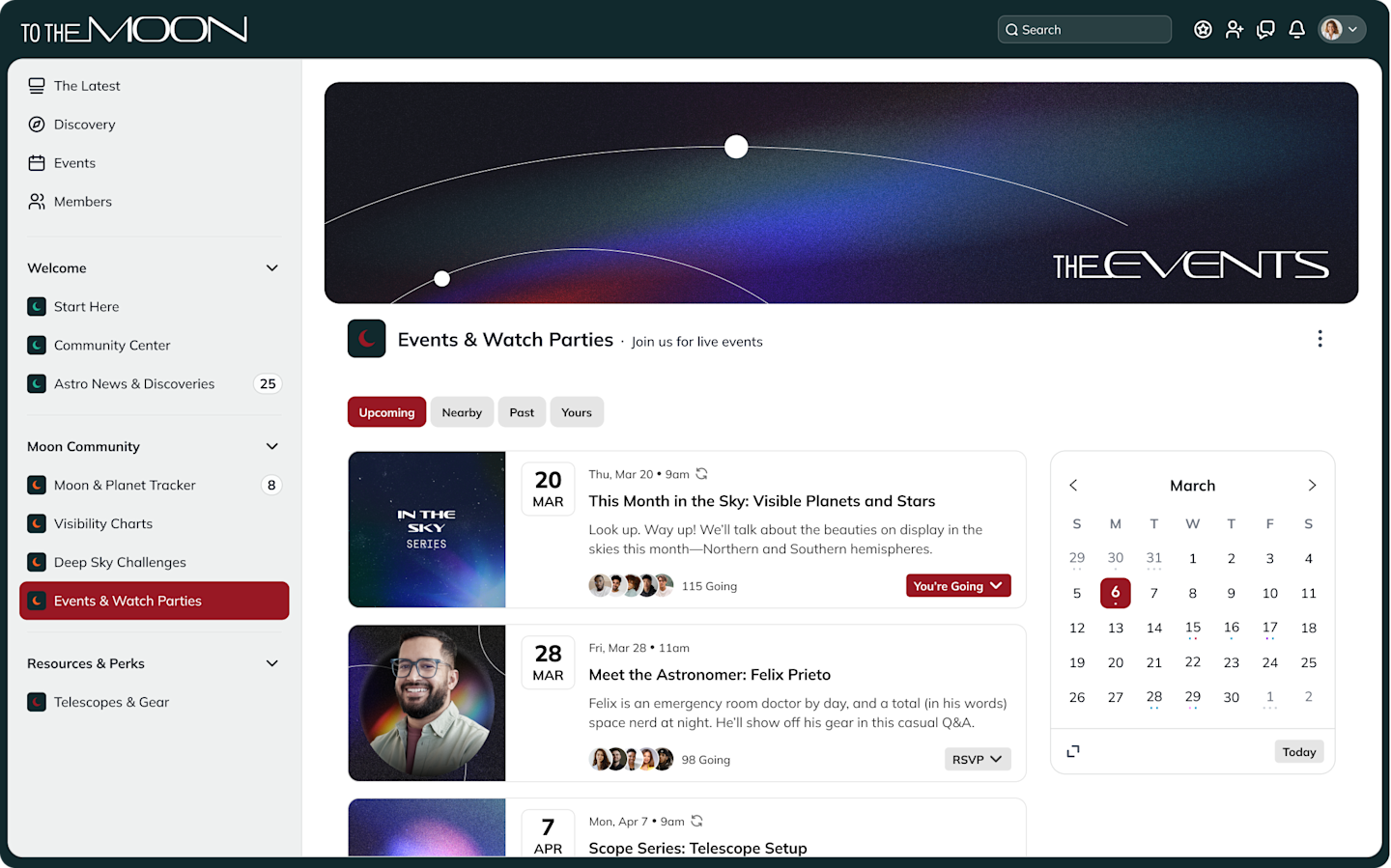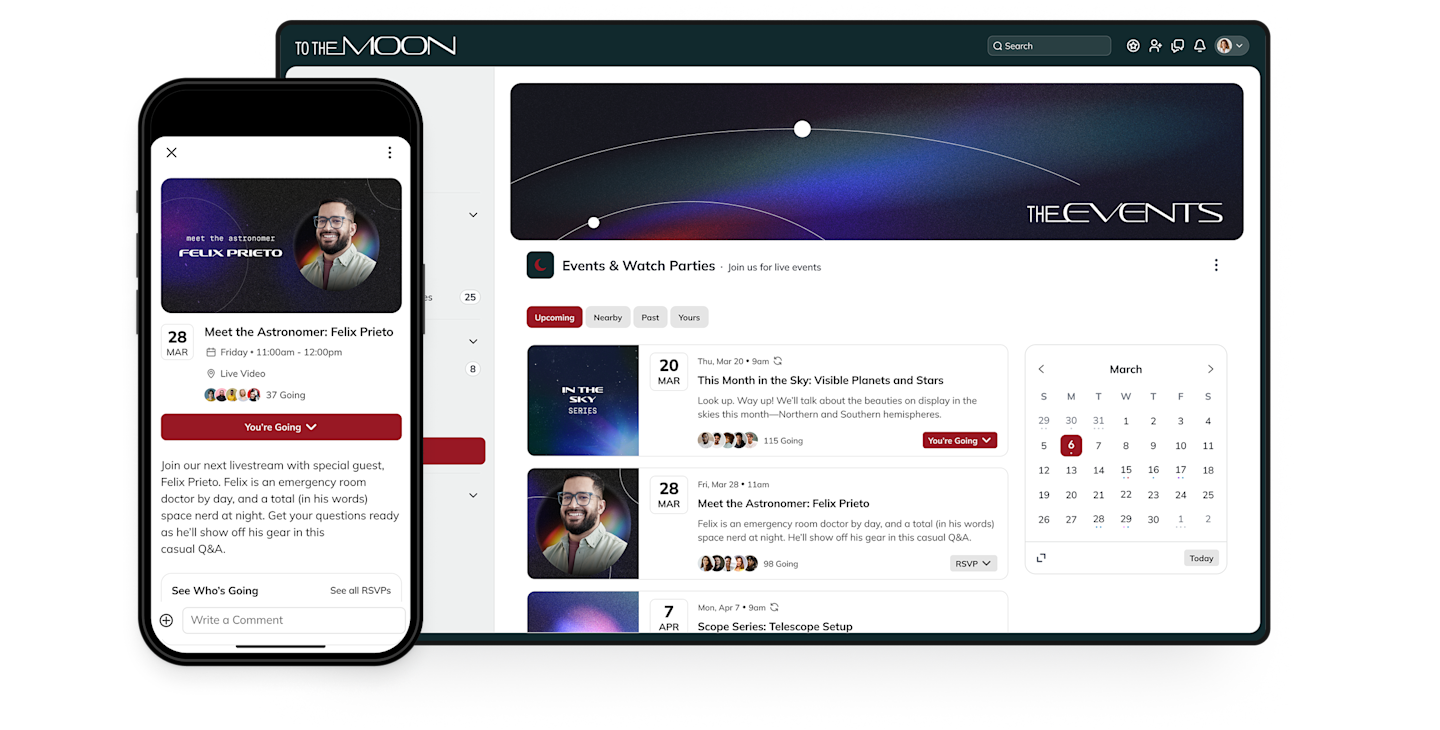Coaching
What Is a Mastermind Group? All You Need to Know (2025)
Learn what a mastermind group is, the benefits of a mastermind group, and some different types of masterminds.
Author
Mighty Team
Last Updated
September 30, 2025

Mastermind groups can be incredible places to learn and grow alongside like-minded people, whether you find one or start your own.
In this article, we’ll show you what a mastermind group is, share some of the benefits of a mastermind group, and some different types of masterminds. We’ll also give you some awesome examples of masterminds from our own Mighty Hosts!
Try the platform with the most $1 million communities.
What is a mastermind group?
Mastermind group definition
A mastermind group is a gathering of like-minded people who meet up frequently in small groups to support, encourage, and learn from each other’s stories, experiences, and ideas and hold each other accountable to well-defined goals. While participants don’t necessarily need to be in the same field, mastermind groups tend to be extremely effective when members share similar roles or titles and a common goal or intention.
The term “mastermind” came from the personal development author, Napoleon Hill. Hill lived in the early 1900s and studied the successful people of his day–industrialists like Andrew Carnegie, Henry Ford, and Charles Shwab. In his 1937 book, Think and Grow Rich, he introduced the idea of a mastermind:
“The master mind may be defined as a ‘coordination of knowledge and effort, in a spirit of harmony, between two or more people, for the attainment of a definite purpose.’” Napoleon Hill - Think and Grow Rich
We’ve seen a ton of masterminds pop up in the last few decades. And while every mastermind group is different, here are a few things most of them have in common:
A group of people with a shared domain of knowledge who bring their expertise and experiences to share.
A facilitator or leader who organizes the group and sessions.
A set of rules or guidelines for community conduct.
A membership fee that’s high enough so members take it seriously.
An openness to learn from each other and keep each other accountable.
Despite the name, no one in a mastermind group is meant to have all the answers. It’s a place where the door is open to learn from both successes and failures. In a mastermind group, everyone stands to benefit from the collective wisdom of the whole—and from the outside perspective each member brings to the table.
The concept of mastermind groups might seem familiar if you’ve participated in peer support or accountability programs before—think of that, but with ideas, solutions, and issues exchanged among peers instead of between people with differing levels of experience.
A mastermind group can be hosted in person or virtually, and there are lots of great mastermind group platforms.

What is a mastermind event?
Usually a mastermind event is the meeting of a mastermind group–either in person or virtual. A good mastermind requires a live meeting (virtual or in-person), and won’t work as well done asynchronously.
Benefits of mastermind groups
In mastermind groups, you’re interacting with your peers and both give and receive advice. It’s also a forum that lends itself naturally to setting goals:
Shrink the learning curve: It takes time to learn to be successful at something. But when you can get in a room of people who have done the thing you’re trying to do, you can learn from them. This shrinks the time to success.
Conquer limiting beliefs: Sometimes your lizard brain is the biggest obstacle to success. It tries to protect you, and you find yourself saying, I can’t do X. Having a roomful of people who will challenge your limiting beliefs can help you conquer them.
Accountability: It’s one thing to say you’re going to make a change. It’s another to know that people you respect are going to ask you whether you took the steps you committed to. That’s accountability!
Get perspective: It’s easy to get caught in the weeds of your day-to-day. For example, business owners often find themselves working in their business instead of on their business. A mastermind can help you zoom out and see the bigger picture.
Grow your network: We’ll do this without the cheesy sayings (“Your network is your net worth!”) BUT if you’re looking at a mastermind group, growing your network is a huge plus.

What makes a mastermind group work?
Experience: Mastermind groups can work at intermediate and expert levels; they’re not usually right for total beginners (a group coaching model works better for newbies). The group members need to be able to share experience and learned knowledge.
Vulnerability: A mastermind group needs to be safe, and it only works if people are vulnerable and honest. Brené Brown’s work on vulnerability and shame shows how being vulnerable is what builds connection. And it’s true in your mastermind. Expressing fears, hopes, and dreams is all part of it–this is also why mastermind group members often become close friends.
Structure: Good mastermind groups aren’t just free-for-alls. An effective mastermind needs structure and intention behind it–and following a schedule is a must.
Active listening: Members of the group need to actively listen and respond to the person who shares, and should ask questions and give feedback.

Consistency: Mastermind groups should meet consistently over a set period of time. This helps them find a rhythm (both for members and the host), and leads to transformation.
Confidentiality: Members should be confident enough to be vulnerable and know that what they share won’t leave the group.
Helpfulness: Mastermind members should be open to helping each other, offering feedback, and sharing resources and connections.
What a mastermind group is not
Often, a mastermind group can be defined by what it’s not. Here are some of the things that a great mastermind group shouldn’t be.
One member monopolizing: You need to find the right balance. Sometimes group members can monopolize or take over. If need be, talk to these people, and if they can’t change consider removing them. The success of your group members is worth it.
Group coaching: Group coaching is fantastic! But a mastermind isn’t group coaching. In group coaching, the coach has the answers and teaches the group together. In a mastermind, the group has the answers and the host’s job is to facilitate.
Telling people what to do: Members can absolutely share thoughts and experience. But each member needs the agency to choose their own goals and commit to them.
Therapy: You can get real in a mastermind group; but it’s not a substitute for professional mental health if a group member needs it.
A networking group: Networking naturally happens in a mastermind, but it shouldn’t be the whole point. If you’re leading a group, screen potential members to ensure they’re looking to go beyond networking toward personal growth.
A place for complaining or judgment: Members can absolutely open up about challenges, but there shouldn’t be room for complaining. In the same way, members should be encouraged not to judge each other.
Hierarchical: Sometimes, mastermind groups can tend to develop hierarchy when certain people dominate or when someone is perceived as more successful. For example, just because a group of entrepreneurs has one very successful member doesn’t mean everyone needs to defer to that person. Regardless of social status or achievements, it needs to be a community of equals.
Mastermind Example - Wealth Without Wall Street
Financial advisors Russ Morgan and Joey Mure wanted to help people think differently about wealth creation–moving outside of stock trading and watching the Dow. They launched a coaching community called Wealth Without Wall Street to change the way we see wealth-building.
And they run a mastermind for some of their most devoted members. Here’s what they say about it:

How to start a mastermind group
We have a full guide on how to start a mastermind group, so if you want a more in-depth walk-through DEFINITELY go there!
But here’s a quick breakdown of the steps we recommend:
Create your tentative Big Purpose. A Big Purpose is the raison d’etre of any group, the vision that brings you together. We have a free mastermind group name generator that will create a Big Purpose for you (and a name if you don’t have one!) Try it!
Select your Ideal Members. In the examples above, most groups handpicked their members. Carefully selecting the people (or types of people) you’d like in the group, and maybe even interviewing them, helps to create a successful foundation.
Solidify your Big Purpose: Make sure your members agree on the Big Purpose! You can do this in the first meeting (and make changes if necessary).
Choose a platform: If you’re running a group online OR if you want to keep organized and conversations going between sessions, choose a mastermind platform to host on.
Set the rules: Set and agree on the rules of engagement for your group and lay out community guidelines.
Set a price: We’d suggest having a membership fee. Read Dan Miller’s quote above again. It’s counterintuitive, but a membership fee will help your group be more successful.
Choose a frequency: Agree on how often you’ll meet (and where if you’re not meeting virtually).
Decide a meeting structure: Choose what your meetings will look like (and stick to it). It’s common for mastermind sessions to include a chance for a member to bring a problem, a round-table sharing session, and Q&As.
Launch!

Types of mastermind groups
There are many types of mastermind groups, and they’re usually organized between people who have similar lateral levels of responsibility within a company structure or who align to a particular identity. CEOs of similar businesses might meet up to discuss overarching strategy, while middle management might gather to discuss specific hands-on challenges (for example, helping employees shift from an office environment to working from home). Entrepreneurs might join a mastermind of those with similar businesses.
Mastermind groups can be ongoing events, or they might be formatted as a mastermind course, session, event, or class dedicated to thinking around a certain challenge or issue.
Here are some common types of mastermind groups–and yup, there’s some crossover between these categories:
Entrepreneurial mastermind groups: Napoleon Hill coined the term “mastermind” by studying the greatest entrepreneurs of his day, so maybe it’s not a surprise that many entrepreneurs are in mastermind groups (and attribute them to their success).
Leadership mastermind groups: Leadership can be a lonely calling, and that’s why many leaders join mastermind groups to get exposure to peers to help them grow.
Career advancement masterminds: We’re seeing masterminds becoming an important part of any career journey (not just entrepreneurs). Masterminds can help members be intentional about careers and progress by sharing knowledge.
Personal development masterminds: Growth is hard, and masterminds can be amazing for personal development.
Technical skills masterminds: Nathan Lively’s story above shows the value of a mastermind for sharing technical knowledge and gaining mastery of high-value skills.
Personal finance and/or investment masterminds: Like Wealth Without Wall Street, thriving masterminds can be built around sharing personal finance knowledge and growing wealth.
Parenting masterminds: These aren’t as common, but parenting is tough. Masterminds can really help parents grow and learn together.
Where to find a mastermind group
If you’re more interested in joining a mastermind group than starting one, where can you find it? Here are some ideas for where to find a mastermind group:
Sites like Meetup.com and Facebook’s directory of events are great places to find out where mastermind groups take place in your local area.
Search LinkedIn for the word “mastermind.” You can filter by either region OR with a modifier to find a specific group (e.g. “parenting mastermind). Note that this will help you find facilitators by their LinkedIn profiles– you can then message them.
If you follow creators or thought leaders, check their websites for masterminds. A lot of creators run them.
Ask friends in your industry for recommendations or ideas.
Check your local business support organizations or community bulletin boards.
And if all else fails, don’t be afraid to start your own! We’ve given the steps above.
Want to launch a mastermind?
We hope this guide to all things mastermind groups has helped to get a grasp on what they are and aren’t. And if you want to launch your own mastermind quickly and easily, come build with Mighty!
Mighty Networks is a unified member platform that lets you bring together content, community, courses, commerce, and live events. You can create private mastermind spaces, easily charge for access, and set meeting times with the events feature (and collect RSVPs). It’s the only software you’ll need to start an online mastermind group–and with our mastermind group generator you can be ready to start inviting your first members 10 minutes from now.
Try it yourself! It’s free for 14 days.
FAQs
1. What is the typical time commitment expected of mastermind members?
The most common frequency is a monthly meeting for 2-4 hours. You need enough time that people can benefit and you can work through things. But this amount of time is usually not so much that a busy member can’t handle committing to it.
Depending on your meeting structures and mastermind culture, there may be time in between meetings reviewing or taking notes, reflecting on your progress, or even talking to another member. This might be (max) of 1 hour each week.
Or, if you have an online community platform that your mastermind lives in, there could be some posting and messaging in it. Often this is just a few minutes a day (or even a few minutes a week), and it helps you keep up to date.
2. What is the difference between a mastermind group and a peer advisory board?
A mastermind group is a group of peers sharing struggles and growth points, learning and growing together. It focuses on accountability and shared problem solving, but members usually share ambition. They’re hungry. That’s what makes it work. Mastermind groups are also voluntary associations–people join for a shared purpose and vision.
Peer advisory boards are usually set up as formal structures (often within an organization), and emphasize more established members overseeing younger members–and organizational growth as a whole.

3. What is a "hot seat" session in mastermind terminology?
The “hot seat” is usually a specific format of mastermind groups. Since there’s usually limited time, many masterminds choose to let members take turns in a “hot seat.” The group will focus on their questions and issues, coaching and working with that one person and their situation. This allows for deep engagement in limited time. For example, if 10 members came to a 2 hour meeting, there isn’t time to do a deep dive on all of their challenges. The “hot seat” approach lets them get this kind of focused attention.
4. What is the average price range for joining a paid mastermind group?
It’s really difficult to give one average cost, because masterminds have a huge swath of pricing, from hundreds for newbies to hundreds of thousands. Here’s a good guiding range.
Entry-level entrepreneurs and small business masterminds usually range from $200-$800 monthly.
Mid-level groups with cultivated memberships (perhaps minimum net worth or business requirements) often charge anywhere from $1,000-$3,000 monthly.
Professional masterminds with exclusive experts and industry leaders can be anywhere from $5,000-$25,000 /mo, and really the sky is the limit. The higher you go, and the more exclusive and cultivated a mastermind is, the more it will cost.
There may be free options out there. You could even start one. But the money matters. The thing is, people pay attention once they have some skin in the game. And as we talked about above, if people don�’t pay for a mastermind, they don’t tend to value it. And if they don’t value it, are they really going to do transformative work?
5. What is the recommended duration or lifecycle of a mastermind group?
Honestly, 6-12 month cycles are great. Then pausing for a reset, and re-assessing if the members want to move forward, is a good idea. The thing is, you need ongoing buy-in. Members need to care 100%. And if your group becomes routine, or something they take for granted, they might lose focus. Keep it time bound. This lets members decide if they want to keep going, and jump in with both feet!
6. What is the return on investment someone can realistically expect from a mastermind group?
It’s honestly really hard to put a dollar value on it. That sounds like a cop-out (and maybe it is). But seriously, there are some factors to think about when considering ROI.
What financial increases will you see in your business from joining?
What improvement to your mental health, personal growth, and business psychology will you see by joining? (That’s worth something!)
What’s the value of what you’ll learn from the group that you maybe couldn’t learn elsewhere? (e.g. Learning from successful business owners as you struggle.)
What is the ROI of the network of fellow entrepreneurs, in terms of new opportunities, partnerships, and investments?
These are all things that go into an ROI that make it hard to judge. You’ll need to identify which are most important to you.
7. What is the role of trust and confidentiality in sustaining a successful mastermind?
Trust and confidentiality are absolutely vital. Members are sharing personal struggles, business information, and real numbers in vulnerable and open ways. That vulnerability can only work if you foster deep trust in a group.
Most groups have a confidentiality agreement (often even requiring signatures). There are clear rules and there should be penalties for violating. It’s absolutely vital to keep the trust intact.
8. What is the ideal mix of professional backgrounds or skill sets for a high-performing mastermind group?
There’s one common thing you need. Drive. The people who are there need to care a lot, and be excited to work to improve themselves. Many masterminds work when the members are on roughly similar levels of expertise. That way they can learn from each other. If a business mogul dropped into a first-time entrepreneur’s group, it might be a bit boring for them. But of course, sometimes masterminds know this and allow it. In this case, it’s often about members getting access to a key business figure’s mastermind–which they pay for.
Members don’t all need to be in the same niche or market to learn from each other, but they usually need to be on a similar journey; for example, growing a thriving business.
9. What is the logical next step once a member has achieved or outgrown their goals within a mastermind group?
For people who benefit from masterminds, usually outgrowing one means you need to find a new one. Some large mastermind companies have different levels within them (e.g. one large internet mastermind is divided by revenue–bronze: $50,000-$250,000, Silver: $250,000-$1 million, Gold: $1 million+). Some people also choose to start or facilitate their own mastermind after they’ve been in one and benefited from it.
Ready to start building your community?
Start a free 14-day trial to explore Mighty—no credit card required.
More like this
Join Mighty Community
Learn the principles of Community Design™ (and see them in action) alongside thousands of creators and entrepreneurs. It's free to join!

Online Courses
Creating a Course
Teaching a Course
Course Platforms
Selling a Course
Communities & Memberships
Community Platforms
Managing a Community
Building a Community
Growing a Community
Monetizing a Community
Content Creation
Creators & Entrepreneurs
Monetization
Content Creation
Starting a Business
Website Builders
Creating & Managing a Website
Events
Event Platforms
Hosting & Marketing Events
Branded Apps
Creating a Mobile App
Coaching Apps
Community Apps
Coaching
Mastermind Groups
Starting a Coaching Business
Coaching Platforms
Filter by Category
Online Courses
Communities & Memberships
Creators & Entrepreneurs
Events
Branded Apps
Coaching
Start your free trial
14 Days. No Credit Card Required.



















